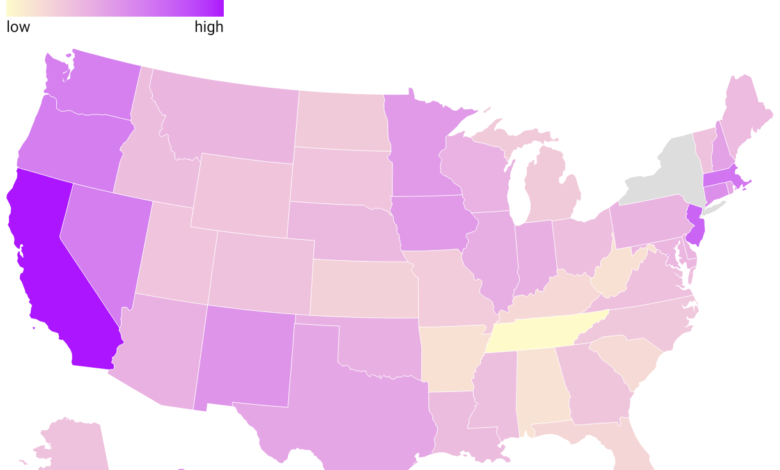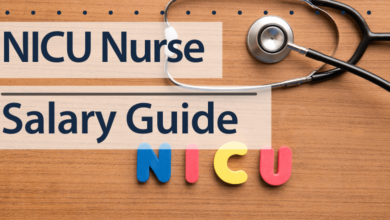Nurse Practitioner Salaries by State

Nurse Practitioners (NPs) earn an average annual salary of $121,610, according to the U.S. Bureau of Labor Statistics. But how much they make is really dependent on the state they work in. This article will show you the average nurse practitioner salary by state, and tell you how you can earn the highest possible salary no matter what state you work in.
| State | Annual Mean Salary |
| Alabama | $106,610 |
| Alaska | $116,390 |
| Arizona | $121,410 |
| Arkansas | $107,110 |
| California | $158,130 |
| Colorado | $116,440 |
| Connecticut | $131,490 |
| Delaware | $120,570 |
| District of Columbia | $131,270 |
| Florida | $110,310 |
| Georgia | $115,440 |
| Hawaii | $128,310 |
| Idaho | $117,720 |
| Illinois | $122,310 |
| Indiana | $121,730 |
| Iowa | $128,180 |
| Kansas | $111,670 |
| Kentucky | $109,290 |
| Louisiana | $118,210 |
| Maine | $118,300 |
| Maryland | $119,650 |
| Massachusetts | $138,700 |
| Michigan | $113,780 |
| Minnesota | $128,160 |
| Mississippi | $117,260 |
| Missouri | $113,180 |
| Montana | $119,960 |
| Nebraska | $118,970 |
| Nevada | $136,230 |
| New Hampshire | $125,780 |
| New Jersey | $143,250 |
| New Mexico | $129,560 |
| New York | – |
| North Carolina | $114,450 |
| North Dakota | $113,940 |
| Ohio | $117,440 |
| Oklahoma | $121,740 |
| Oregon | $136,250 |
| Pennsylvania | $120,550 |
| Rhode Island | $125,250 |
| South Carolina | $109,130 |
| South Dakota | $115,610 |
| Tennessee | $99,330 |
| Texas | $124,660 |
| Utah | $115,610 |
| Vermont | $116,610 |
| Virginia | $116,980 |
| Washington | $135,590 |
| West Virginia | $106,790 |
| Wisconsin | $121,210 |
| Wyoming | $115,230 |
Source: BLS, Data extracted September 19, 2023
If you want to make the most money as a nurse practitioner, these are the states you’ll want to work in. Keep in mind that often, the highest-paying states also come with a higher cost of living.
- California – $158,130 per year
- New Jersey – $143,250
- Massachusetts – $138,700
- Oregon – $136,250
- Nevada – $136,230
Even in the lowest-paying states, with the exception of Puerto Rico, NPs can still make close to, or above, six figures. The five lowest-paying states for NPs are:
- South Carolina – $109,130
- Arkansas – $107,110
- West Virginia – $106,790
- Alabama – $106,610 / year
- Tennessee – $99,330 / year
Source: BLS
Many things can impact your salary as a nurse practitioner, like years of experience, the company you work for, or your NP specialty. But the most significant factor is location.
Southern states such as Florida, Georgia, and Alabama pay much less than West Coast and New England states. In some cases, the difference is over $40,000.
But there are a lot of ways to increase your salary, especially in states with below-average NP salaries.
Increase Your Education
Education level matters when it comes to earning a higher salary. Nurse practitioners with a doctorate often make more than those with a master’s degree.
Show Me DNP Programs
Become a Travel NP
You may have thought that travel nursing excludes nurse practitioners, but that’s not true! Not only is travel nursing a great way to explore different parts of the country and offer rich learning experiences, but it can offer a higher income for NPs as well.
Career Nurse Practitioners
Career NPs are full or part-time staff employed by a facility and typically earn a higher per-hour rate for each year they work. Career NPs usually also have a generous benefits package which may include:
Per Diem NPs
Per diem NPs usually earn a higher per-hour rate for their work flexibility. However, most facilities that employ per diem NPs typically don’t offer any additional benefits, and if they do, they include much less than career nurses receive.
One of the main benefits of working per diem as a nurse practitioner includes choosing your work schedule. This may work well for per diem NPs who also work at another hospital.
Overtime
Nurses who work overtime are entitled to increased pay for their additional work hours. In most cases, this means working over 40 hours a week.
The Federal Fair Labor Standards Act (FLSA) requires that all “non-exempt” employees receive overtime pay equal to one-and-one-half times their regular pay rate for every hour over 40 hours worked during a work week. This usually includes career NPs who are not working on a per diem or contract basis.
Bonuses
Most NPs do not receive bonuses. However, some facilities may offer a sign-on bonus as an incentive to take a position at a new facility. Bonuses may range from several hundred dollars to several thousand dollars.
Shift differential
NPs may have an opportunity to earn more income without increasing the number of hours they work. A shift differential means making more per-hour pay for working nights, weekends, or holidays.
Hazard Pay
According to the U.S. Department of Labor, hazard pay means “additional pay for performing hazardous duty or work involving physical hardship.” It may also include work duty that causes “extreme physical discomfort and distress.”
Some areas are suffering from lack of practitioners and with an increasing number of hospitalized patients, may still be able to receive hazard pay.







